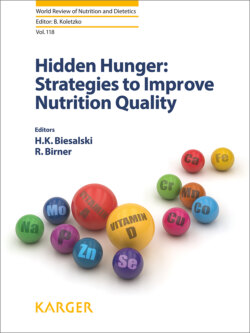Читать книгу Hidden Hunger: Strategies to Improve Nutrition Quality - Группа авторов - Страница 26
На сайте Литреса книга снята с продажи.
How Do We Interpret the Role of Public Partners in Germany?
ОглавлениеAdequate nutrition is an issue of high political importance in Germany. There are growing concerns about the production conditions, leading to a strong public interest in information about the composition of foodstuffs. There is a strong demand for clear indications at the point of sale and/or on the packaging [11–13]. Simultaneously, changing lifestyle habits lead to an increasing level of overweight and obesity while, on the other hand, concerns also grow regarding insufficient nutrition especially among elderly people and specific social groups [14–22].
At the national level, since 2008, the Federal Government and the Federal States are active to improve the quality of food in schools and kindergartens, to establish quality standards for food in community catering and to establish networks to better reach specific groups of the population. As a national strategy for better nutrition and more physical activity, these activities are jointly led by the Federal Ministries for Agriculture and Food and for Health. It is implemented in close cooperation with the Federal States and local authorities, who are responsible in first hand. It broadly takes on board research institutions and works as a multi-stakeholder initiative, linking nutrition, health, education, public information, and agriculture [23–26].
In 2017, the Federal Minister for Agriculture and Food, Christian Schmidt, has significantly pushed forward these activities by establishing the Federal Centre for Nutrition as a branch of the Federal Office for Agriculture and Food [27]. The Centre will not only continue the networking activities of the previously mentioned national strategy for better nutrition and more physical activity. It will expand and intensify them, for example regarding the quality of food in schools and kindergartens, the culture of having a meal together, as well as regards improved nutrition for mothers and their children, during pregnancy and the first 2 years after a child’s birth [28]. These are core objectives of Germany’s nutrition policy.
Furthermore, the Centre supports the Scientific Committee on the Composition of Foodstuffs in its task to ensure transparent consumer information, and it deals with the reduction of food losses along the value chain from the farm up to the final consumer. Communication is the Centre’s second pillar. Extensive information about nutritional issues and influence on the environment where people eat and make food choices will help empower consumers to make the appropriate choice about nutrition and to make the healthy choice the easy choice.
A comprehensive strategy will be set up to reach the general public directly, and via multipliers and through all appropriate media under the headline “From Knowledge to Action.” Together with the new Federal Institute for Research on Child Nutrition, these activities illustrate that Germany indeed places a high priority on improved nutrition quality. Federal Minister, Schmidt, did so in view of Germany´s obligation to reach the SDGs and the Commitments deriving from the Rome Declaration by the International Conference on Nutrition-2 in 2014 [29, 30]. Consequently, Germany will not focus on activities at the national level only.
On the contrary, we are deeply convinced that we can achieve our goals in Germany only in an intense exchange and cooperation with sister institutions in other countries. Nutrition is an issue for all of us. Malnutrition is a global issue, we may be differently affected, but the task remains the same. Consequently, Germany has given specific attention to nutritional issues already in the past in its support of the work of FAO and WHO. Scaling up nutrition is also a characterizing element of Germany’s development activities. Improving the nutritional situation in partner countries is a prime objective for German development cooperation projects in the framework of the German initiative “One World – No Hunger” [31].
